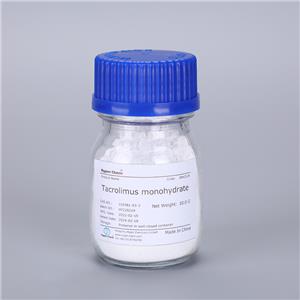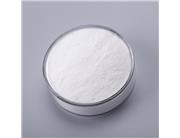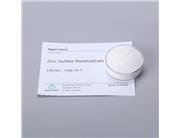Description:
Tacrolimus monohydrate is a medication that belongs to a class of drugs known as calcineurin inhibitors.
It is a hydrate form of tacrolimus, which is a potent immunosuppressive agent used to prevent rejection in organ transplantation.
Properties:
Type: Calcineurin inhibitor
Mechanism of Action: Tacrolimus inhibits the activity of calcineurin, a protein phosphatase that plays a key role in the activation of T-lymphocytes. By blocking calcineurin, tacrolimus suppresses the immune response.
Uses:
Organ Transplantation:
Tacrolimus monohydrate is primarily used in organ transplantation to prevent rejection of transplanted organs, such as kidney, liver, heart, and lung transplants. It is often used in combination with other immunosuppressive medications.
Autoimmune Diseases:
In certain autoimmune diseases, such as rheumatoid arthritis, psoriasis, and inflammatory bowel disease, tacrolimus may be prescribed to suppress the immune response and reduce inflammation.
Dermatological Conditions:
Tacrolimus ointment, a topical formulation of tacrolimus, is used to treat certain dermatological conditions like eczema (atopic dermatitis). It helps to reduce inflammation and itching associated with these skin conditions.
Ophthalmic Use:
Tacrolimus eye drops are sometimes used in the treatment of certain eye conditions, such as vernal keratoconjunctivitis and refractory vernal keratoconjunctivitis, to reduce inflammation and symptoms.
Precautions:
Dosage: The dosage of tacrolimus monohydrate should be carefully monitored and adjusted by a healthcare provider based on individual patient factors, including weight, age, and kidney function.
Monitoring: Regular monitoring of blood levels of tacrolimus is essential to ensure therapeutic efficacy and minimize the risk of toxicity.
Side Effects: Common side effects of tacrolimus may include tremors, hypertension, nephrotoxicity, and an increased risk of infections due to immunosuppression.
Interactions: Tacrolimus can interact with a variety of medications, so it is important to inform healthcare providers about all medications being taken.
Contraindications:
Individuals with hypersensitivity to tacrolimus or any of its components should avoid its use.
Patients with certain medical conditions, such as severe infections or liver dysfunction, may not be suitable candidates for tacrolimus therapy.
In summary, tacrolimus monohydrate is a calcineurin inhibitor used primarily for immunosuppression in organ transplantation to prevent rejection.
It is also employed in the treatment of autoimmune diseases, dermatological conditions, and certain eye conditions. Close monitoring of dosage, blood levels, and potential side effects is crucial during treatment with tacrolimus to ensure optimal therapeutic outcomes and patient safety.
Product Forms: Injectable Solution, Oral Capsules/Tablets
Payment method: T/T in advance, Paypal, Western Union, L/C, etc.
Shipping ways: Courier, Air, Sea, Road
Storage Condition: Dry, dark, and at 0 - 4 C for short term (days to weeks) or -20 C for long term (months to years).

 China
China




